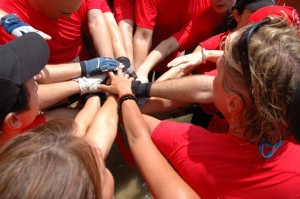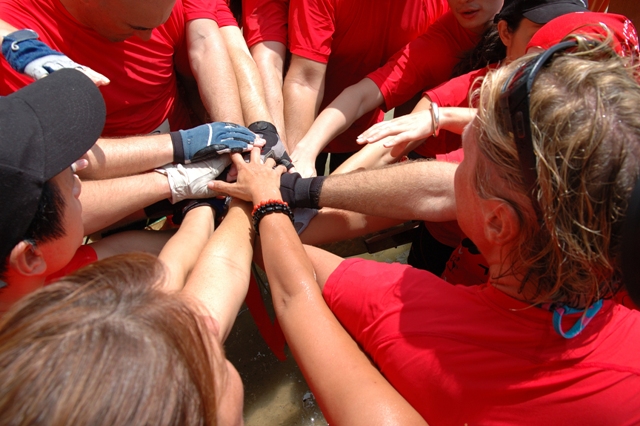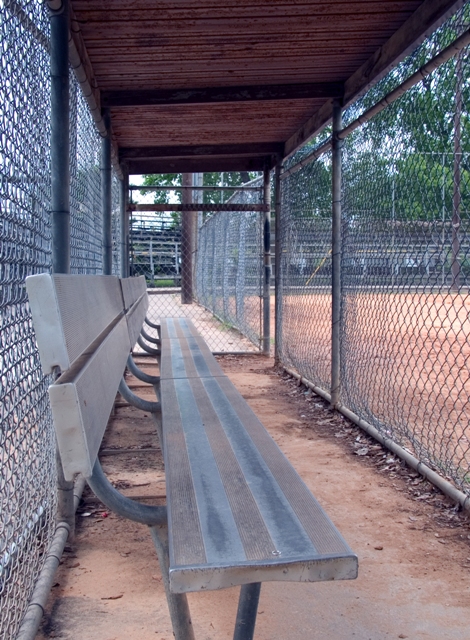Teamwork
“The Way A Team Plays As A Whole Determines Its Success. You May Have The Greatest Bunch Of Individual Stars In The World; But If They Don’t Play Together, The Club Won’t Be Worth A Dime. ” – BABE RUTH

Having spent many years of my career as a Certified Athletic Trainer in professional baseball, at the Minor League and Major League level, I understand the importance of the TEAM concept and what it takes for a TEAM to be successful. For example, a baseball team is comprised of 25 players, the manager, coaches, and a Certified Athletic Trainer ( NATA / BOC ). For today’s game, the major league level has a greater auxiliary and coaching staff.
Typically in the United States, a season lasts from Spring Training reporting in February and runs until late September or early October (if you’re fortunate). Most teams play the requisite 30 or so spring
training games and then march right into the 162 game regular Season. The drills of spring training would only be played out in the ensuing months, although no two games were ever the same or would you know when that muscle memory would have to “kick into gear” to successfully throw the runner out from various positions in the infield or outfield. Training meant the endless bullpen “sidelines” with the pitching coach correcting mechanics or saying nothing. It also meant endless time in the batting cage with the hitting instructor doing soft toss drills. Yes, the players were all trying to hone their skills, fighting to become the best they could become to progress to the level above and ultimately the Major Leagues.
The same 25 players and staff had to come together day in and day out and perform as TEAMMATES. No successes would come from the individual stellar pitching performance, if indeed an offensive catalyst or
two were absent. Conversely, a great offensive night by 8, combined with poor pitching by several, spelled trouble and bellyache for the Manager.
What really makes up a great TEAM?
For the purpose of this writing I turn to Wikipedia to give us the textbook definition of TEAM: A team comprises a group of people or animals linked in a common purpose.
Teams are especially appropriate for conducting tasks that are high in complexity and have many interdependent subtasks.
A group in itself does not necessarily constitute a team. Teams normally have members with complementary skills and generate synergy through a coordinated effort, which allows each member to maximize his/her strengths and minimize his/her weaknesses. Team members need to learn how to help one another, help other team members realize their true potential, and create an environment that allows everyone to go beyond their limitations.[1] A team becomes more than just a collection of people when a strong sense of mutual commitment creates synergy, thus generating performance greater than the sum of the performance of its individual members.
Application
Taking the definition alone back to our baseball team, a pitcher couldn’t perform if indeed he/she didn’t have the catcher guiding them or having the position players playing in unison. The synergy generated by this coordinated approach allows just what the definition states: maximizing the strengths and minimizing the weakness. Going beyond one’s true potential can only happen when the team performs together on the same platform, thus allowing the individuals to compliment one another and reach this ultimate level of competition. The combined synergistic energies are what makes a team just that. The classic definition says that the mutual sum of these combined efforts are much greater than the individual accolades.
Success was not a given and true commitment to helping the team was paramount. Incredibly, I came across many players with the “I-I-ME-ME” mentality. Everything was about them! When talking of the team they would often emit “I did this or I did that” VERSUS “we did this and we did that.” This meant they were truly more impressed with their individual successes and the team concept never entered their equations.
It is the greatest feeling when a team comes together and becomes so good together, almost great. Many in the game term this as a “Push Button” club. The manager’s role becomes limited to showing up to the park and pushing a button, if you will, and the TEAM goes out and performs, day in and day out without fail. No change in chemistry is needed as all systems are go! The team is winning games, Players are in the positions they’re supposed to be in, the correct pitch is thrown in the most crucial of situations, timely hitting occurs daily, and the manager sits and watches the fruits of success ripen from the intense daily instruction and practice.
This is a great time for me to introduce you to an article I read on playing together as a TEAM. From my perspective, and as one that has witnessed thousands of games from the dugout perspective, this writing is pretty on point! It comes to us from a blog post entitled THIS OLE GAME: http://www.theoleballgame.com/baseball-teamwork.html. THIS post stands out for me because it reminds me of the Championship Teams I had the honor of working with! All eight components were ever present with those clubs, the philosophies were the same if you will. Thats why I believe they’re applicable! Here they are:
8 Concepts For Teamwork, Or Playing Together As A Team
- We can all count on each other.
- Accept your role on the team.
- Finding a way to win.
- Be willing to make some personal sacrifices.
- Help each other out.
- Understand what we can control and what we cannot.
- Anyone ~ Anytime.
- Walk the talk.
Unfortunately, the TEAM didn’t always come together. The individuals continued to star, albeit not in unison. One player shines one day, another the next, and the result more often than not is not enough to beat the opponent. This group, for whatever reason, just doesn’t seem to work in harmony. This is when It was tough to come to the park every day! Defeated attitudes filled with negativity. Even “one’ could spoil the whole bunch. This is what player development was about. It was survival of the fittest in the baseball world, with the cream rising to the top. Work approaches were either so finely tuned or so off. More often than not, “The successful” had their routines and went about their business quietly, unnoticeable but oh so productive. Those who struggled, struggled! On and off the Field! “Poor work ethic. Not focused. Negative attitude. Not having the ability to complement their teammates.”
Athletic teams are driven to the ultimate, the championship of that given sport! The NFL’s Super Bowl, MLB’s World Series, NHL’s Stanley Cup, . You get the point. These are the ultimate, the pinnacles! These are the Goals all good teams strive to achieve. From the family perspective, are all the necessary components in place to achieve a similar goal?
What’s in it for Us?
My message here is presented and revealed in the form of several self questions:
- WHO IS ON YOUR TEAM?
- Are you doing your best to be a team player?
- Are the players around you complimenting you and your play, day in and day out or are they hindering your progress?
- Are you all on the same mission?
- Do your “teammates” all have the same goals in mind or are they playing for themselves?
- Is your Support Team of Coaches, Physicians, Certified Athletic Trainers and Personal Trainers “on point”?
- Are family members on board and if not, why not?
- What can you do to better this situation?
- Am I too much “I-I-ME-ME” versus “US-US-WE-WE”?
Remember, constant re-evaluation of your “team’s roster” is paramount to achieve continued success for yourself and the franchise.
SAK





